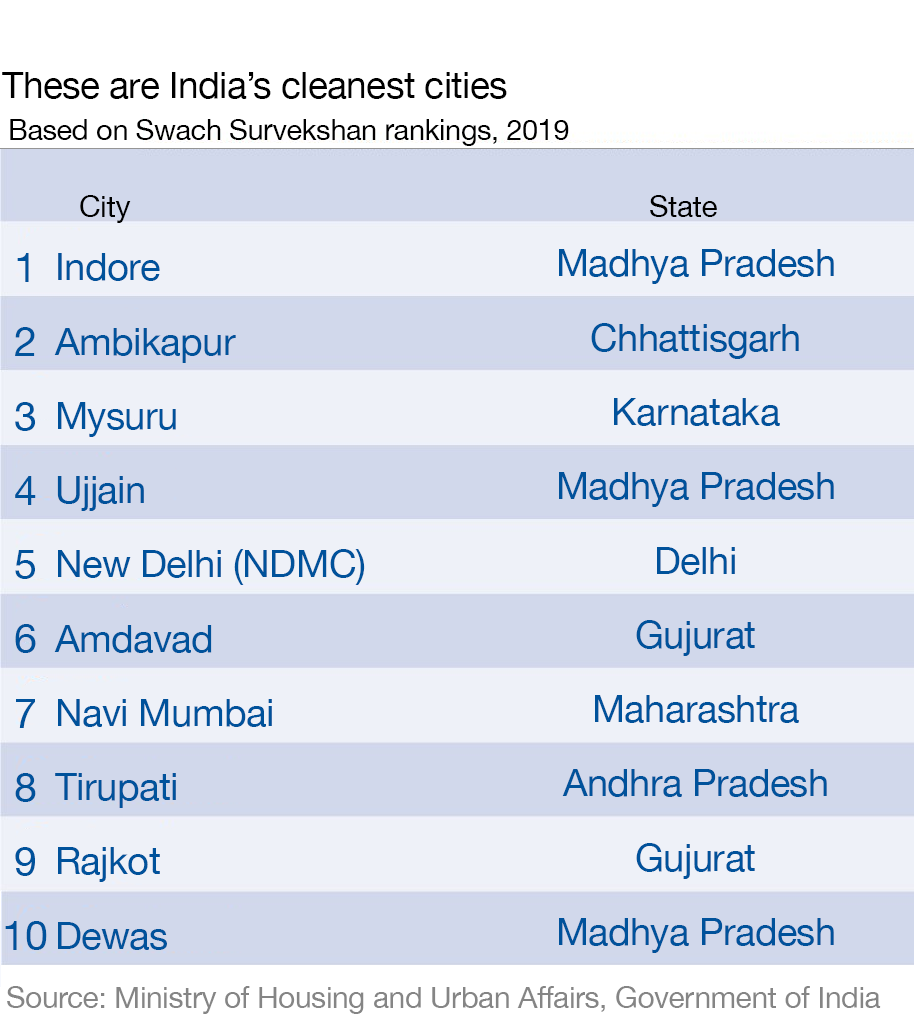These are India’s cleanest cities

Coming in at number 5, New Delhi. Image: REUTERS/Adnan Abidi

Get involved with our crowdsourced digital platform to deliver impact at scale
Stay up to date:
India
Indore is officially India’s cleanest city, topping a national survey for the third consecutive year. It’s a remarkable achievement – just a few years ago, it ranked a lowly 25th.
The Swachh Survekshan report, published by India’s Ministry of Housing and Urban Affairs, looked at 471 towns and cities, awarding scores for areas such as sustainable sanitation, collection and transportation, and processing and disposal.

Trashing the streets
Large bins on Indore’s street corners used to be piled with household waste, forming makeshift dumps that were left to rot waiting for privately contracted garbage trucks to make sporadic collections. The trash piles raised health concerns and were a magnet for cattle, wild dogs and insects.
But things changed in 2016 as the city’s municipal corporation eliminated garbage dumps and implemented a strict programme for sorting household waste. Garbage trucks were introduced to collect waste daily, ensuring the streets remained trash-free.
A major public awareness campaign was launched to teach residents about responsible waste management and help them change their behaviour.
Despite this, the programme initially met with some resistance.
“When the waste segregation began, 80% of people would not segregate waste”, Gautam Kaneria, an Indore garbage truck driver, told IndiaSpend. “We would explain to them why they had to this, and plead with them. If people repeatedly gave unsegregated trash, we would let our supervisors know and fine those households.”
What is the World Economic Forum's India Economic Summit 2019?
Cleaning up
Today, Indore’s streets are trash-free. Most waste is segregated and more than 450 garbage trucks make daily door-to-door collections, tracked from a central control room.
Householders hand over both gila (wet) and sukha (dry) trash in separate lots.
What can be recycled is sold to recycling companies and much of what remains is used in the construction of roads. Organic waste is converted into usable products like compost or fuel.
But Indore’s success isn’t mirrored by all states. For many cities at the other end of the ranking - such as Beed in Maharashtra, Chennai in Tamil Nadu, and Agra in Uttar Pradesh - waste management remains a challenge.
Maharashtra generated more solid waste than any other state, according to figures published in November 2017. Tamil Nadu and Uttar Pradesh both created almost one-and-a-half times the waste produced by Delhi.
India generates around 150,000 tonnes of solid waste each day – the equivalent of 15,000 trucks carrying 10 tonnes each. And the problem is growing as the country’s population swells: one in every six people on the planet live in India, a population that has doubled in size over the past 40 years.
By 2050, the World Bank estimates India’s waste could be three-and-a-half times greater than today, which is indicative of a wider global trend.
Rapid population growth and urban migration is expected to increase annual waste generation to 3.4 billion tonnes by 2050, a 70% increase on 2016 levels.
These predictions assume business as usual. But if more cities follow Indore’s lead and change how their waste is managed, it could help contain the problem.
Don't miss any update on this topic
Create a free account and access your personalized content collection with our latest publications and analyses.
License and Republishing
World Economic Forum articles may be republished in accordance with the Creative Commons Attribution-NonCommercial-NoDerivatives 4.0 International Public License, and in accordance with our Terms of Use.
The views expressed in this article are those of the author alone and not the World Economic Forum.
Related topics:
The Agenda Weekly
A weekly update of the most important issues driving the global agenda
You can unsubscribe at any time using the link in our emails. For more details, review our privacy policy.
More on IndiaSee all
Apurv Chhavi
April 18, 2024
Victoria Masterson
March 20, 2024
Reuters
February 28, 2024
Shakthi Nagappan
February 13, 2024
Priya Singh
February 8, 2024
Thomas Kerr
February 5, 2024







